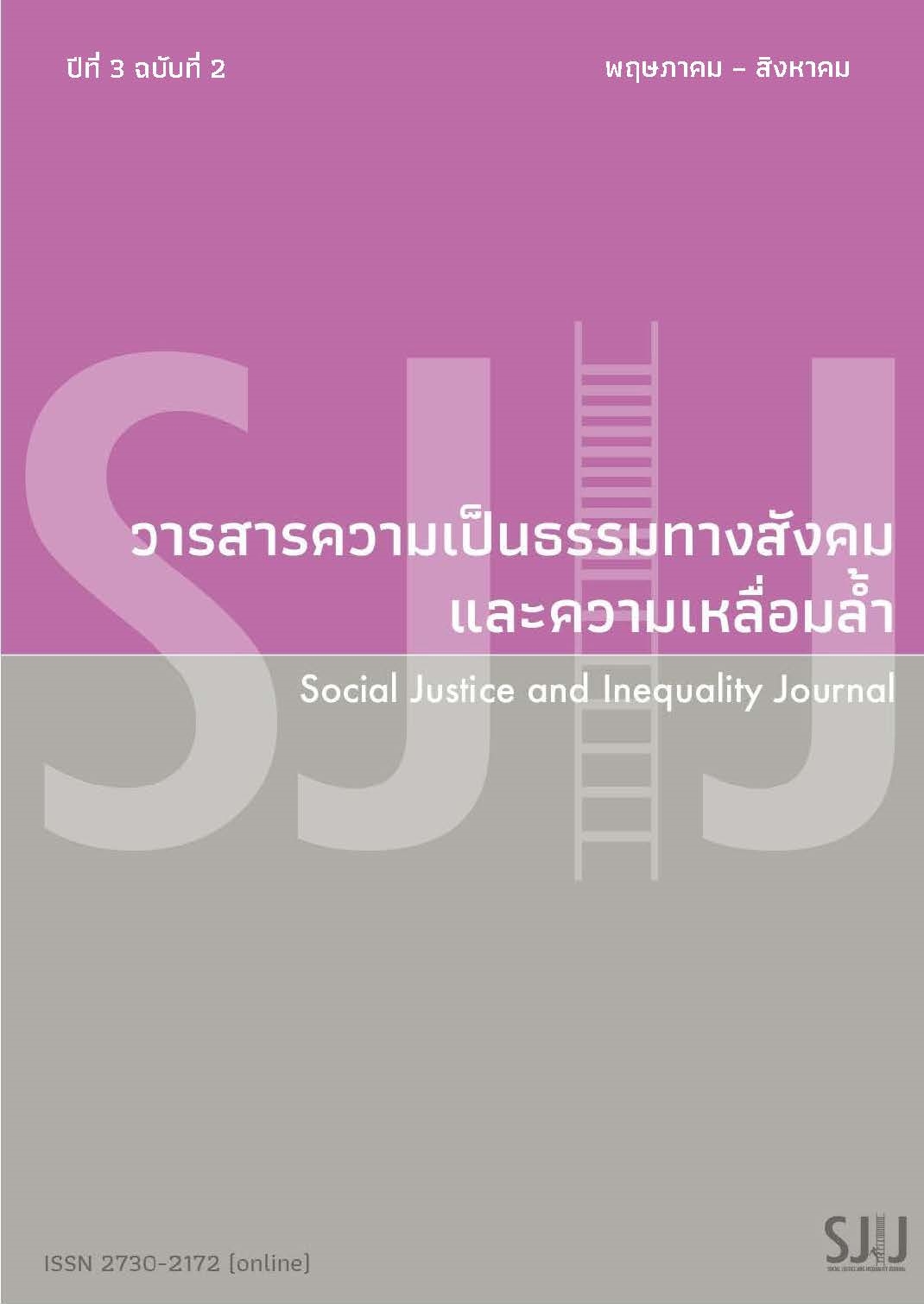New decade of music learning : forward UDL management
ทศวรรษใหม่ในการเรียนดนตรี : ก้าวไปด้วยความเสมอภาค…(ของการจัดการ)
Keywords:
ความเสมอภาค , การจัดการ, การเรียน สอนดนตรีAbstract
สภาพแวดล้อมของการเรียนรู้และกระบวนการที่ใช้ในการสอนและสภาพปัญหาที่เกิดขึ้นในการจัดการเรียนการสอนวิชาดนตรีส่วนใหญ่เติบโตอยู่ในระดับอุดมศึกษา แต่ในระดับการศึกษาขั้นพื้นฐานยังไม่สามารถปรับเปลี่ยนหรือพัฒนาให้สอดคล้องกับสภาพสังคมที่มีการเปลี่ยนแปลงอย่างรวดเร็วในปัจจุบันได้ การนำแนวคิดยูดีแอล (Universal Design for Learning : UDL) มาใช้ในการออกแบบยูดีแอลประกอบด้วยหลักการสามประการ: วิธีการเป็นตัวแทนที่หลากหลาย วิธีการดำเนินการและการแสดงออกที่หลากหลาย และวิธีการมีส่วนร่วมที่หลากหลาย เมื่อนำมาใช้เพื่อเป็นแนวทางในการพัฒนาหลักสูตร หลักการเหล่านี้ช่วยให้เข้าถึงการเรียนรู้ของผู้เรียนได้กว้างที่สุดเท่าที่จะเป็นไปได้ โดยการขจัดอุปสรรคที่อาจเกิดขึ้นและนำเสนอการจัดการเรียนรู้ที่ยืดหยุ่นในการจัดการศึกษาเพื่อสนองต่อผู้เรียนที่หลากหลายสามารถเรียนรู้ได้อย่างเสมอภาค
References
Areekkuzhiyil, S. (2022). Universal design for Learning. Edutracks, 21(4), 19–22.
Arts Council England. (2017). Arts Council England Annual Report and Accounts 2017-18.
CAST, Center for Applied Special Technology. (2011). Universal Design for Learning Guidelines version 2.0. http://www.udlcenter.org/aboutudl/udlguidelines/downloads
Dolan, R. P., & Rose, D. H. (2000). Universal design for learning: Assessment. Journal of Special Education Technology, 15(4).
Eagleton, M. (2008). Universal design for learning.
Educational Council. (2022). The Movable Do vs. The Fixed Do and Relative vs. Tonic Minor [Report of Educational Council at Kansas]. https://www.jstor.org/stable/3382760
Firchow, N. (2016). Universal Design for Learning—Improved access for all. https://www.greatschools.org/gk/articles/universal-design-for-learning-improved-access-forall/
Fleming, D. N., & Mills, E. C. (1992). is the article that initially sets forth the VARK typologies: Visual, Aural, Reading, and Kinesthetic[The VARK typology assessment is now maintained]. www.vark-learn.com
Gargiulo, R. M. (2009). Special Education in Contemporary Society: An Introduction to Exceptionality. SAGE.
Gauldin, R. (2003). Some Personal Reflections on Past Methods of Teaching and What they Can Tell Us About Current and Future Initiatives. Journal of Music Theory Pedagogy, 17.
Gawboy, A. (2013). On Standards and Assessment. In Engaging Students: Essays in Music Pedagogy. Engaging Students: Essays in Music Pedagogy.
Gosden, S. (2013). The “Technology Tools” Session at FlipCamp Music Theory. Engaging
Students: Essays in Music Pedagogy.
Johnson, S. (2009). Notational Systems and Conceptualizing Music: A Case Study of Print and Braille Notation. The Society for Music Theory, 15.
Jou-Lu Hung. (2021). An Investigation of the Influence of Fixed-do and Movable-do Solfège Systems on Sight-Singing Pitch Accuracy for Various Levels of Diatonic and Chromatic Complexity (Doctoral Dissertations of the Faculty of the School of Education Learning and Instruction Department).
Karpinski, G. S. (2000). Aural Skills Acquisition: The Development of Listening, Reading, and Performing Skills in College-Level Musicians. Oxford University Press.
Kennette, L. N., & Wilson, N. A. (2019). Universal Design for Learning (UDL): What is it and how do I implement it? Transformative Dialogues: Teaching & Learning Journal, 12(1), 1–6.
Kivijärvi, S. (2021). Towards equity in music education through reviewing policy and teacher autonomy. Studia musica 88.
Meyer, A., & Rose, D. H. (2002). Teaching every student in the Digital Age: Universal design for learning. Alexandria, VA.
Mislevy, R. J., Behrens, J. T., & Bennett, R. E. (2012). Learning from Outliers: On the Roles of External Knowledge Representations in Assessment Design. MA: Harvard Education Press.
National Association of Schools of Music (NASM). (2013). Handbook 2013-2014. Reston, VA: National Association of Schools of Music.
Nieves, L. H. (2019). A MOOC on universal design for learning designed based on the UDL paradigm. Australasian Journal of Educational Technology, 35(6), Article 6.
Parsons, L. (2015). Aural Skills and the Music Major with Dyslexia. Music Theory Online, Forthcoming.
Payne, D. (2006). Striking the Right Chord (or applying first aid to the wrong one) in the Day of a Theory Teacher. Journal of Music Theory Pedagogy, 20, 139–150.
Rifkin, D., & Stoecker, P. (2011). A Revised Taxonomy for Music Learning. Journal of Music Theory Pedagogy, 25.
Rose, D. H., & Meyer, A. (2002). Teaching every student in the Digital Age: Universal design for learning. Alexandria, VA.
กุญชรี ค้าขาย และ ทัศนีย์ ไพฑูรย์พงศ์. (2560). ความทั่วถึงและเท่าเทียมของการจัดการศึกษาในสถานศึกษาขั้นพื้นฐาน (พิมพ์ครั้งที่ 1). เลขาธิการสภาการศึกษา กระทรวงศึกษาธิการ.
เกษมสันต์ ตราชู, สยาม จวงประโคน,และ เฉลิมพล โลหะมาตย์. (2564). การพัฒนากิจกรรมการเรียนรู้ทักษะทางดนตรีตามแนวคิดของดาลโครซ สำหรับนักเรียนชั้นประถมศึกษาปีที่ 4. วารสารมนุษยศาสตร์ และสังคมศาสตร์ มหาวิทยาลัยมหาสารคาม.
จิตติวิทย์ พิทักษ์. (2560). สภาพปัญหาเกี่ยวกับการจัดการเรียนการสอนดนตรีของโรงเรียนสาธิต มหาวิทยาลัยขอนแก่น. วารสารศิลปกรรมศาสตร์ มหาวิทยาลัยขอนแก่น, 11(1), 225–237.
ณรุทธ์ สุทธจิตต์. (2541). จิตวิทยาการสอนดนตรี. กรุงเทพฯ: สำนักพิมพ์แห่งจุฬาลงกรณ์มหาวิทยาลัย.
ณรุทธ์ สุทธจิตต์. (2554). กิจกรรมดนตรสำหรับครู(พิมพ์ครั้งที่ 3). กรุงเทพฯ: สำนักพิมพ์แห่งจุฬาลงกรณ์ จุฬาลงกรณ์มหาวิทยาลัย.
ธวัช เติมญวน. (2548). การพฒั นารูปแบบการจดัการเรยีนการสอนทมี่ ปีระสทิธิภาพในการจดัการศกึษา ระดับปริญญาตรีของสถาบันอุดมศึกษา สังกัดกรมศิลปากร. มหาวิทยาลัยศรีนครินทรวิโรฒ.
สำนักวิชาการและมาตรฐานการศึกษา กระทรวงศึกษาธิการ. (2552). ตวัชวี้ดัและสาระการเรยีนรู้แกนกลางกล่มุ สาระการเรียนรู้ศิลปะ ตามหลักสูตรแกนกลางการศึกษาขั้นพื้นฐาน พ.ศ. 2551 (พิมพ์ครั้งที่ 1). สำนักวิชาการและมาตรฐานการศึกษา.
สุริยันต์ แสงงาม. (2562). การพัฒนาความมีวินัยในตนเองของเด็กปฐมวัยที่ได้รับการจัดประสบการณ์ กิจกรรมดนตรีตามแนวคาร์ล ออร์ฟ โรงเรียนบ้านเขว้าศึกษาอ าเภอเมือง จังหวัดชัยภูมิ. วารสารวิจัยราชภัฏกรุงเก่า, 6(3), 61–68.
อนุวัฒน์ เขียวปราง. (2560). สภาพปัญหาและแนวทางการแกไ้ขการจดัการเรยีนการสอนเนอื้หาเกี่ยวกับจังหวะ (ใน รายงานการประชุม การประชุมวิชาการระดับชาติ สมาคมสถาบันอุดมศึกษาเอกชนแห่งประเทศไทย ประจ าปี 2560, pp. 1047–1057). มหาวิทยาลัยรัตนบัณฑิต.
สัมภาษณ์
ปราโมท ด่านประดิษฐ์. สัมภาษณ์ 16 กรกฎาคม 2565.
สุพัตรา วิไลลักษณ์. สัมภาษณ์ 15 กรกฎาคม 2565.
Downloads
Published
Issue
Section
License
Copyright (c) 2022 Social Justice and Inequality Journal

This work is licensed under a Creative Commons Attribution-NonCommercial-ShareAlike 4.0 International License.




